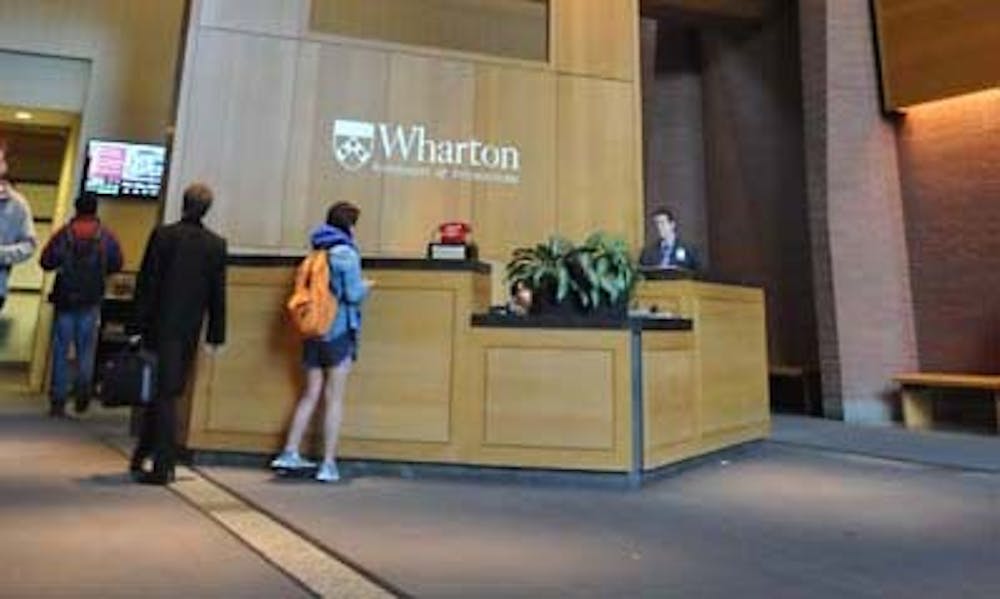Wharton responded to recent Wall Street Journal claims of its decline saying that the decrease in the number of applications did not matter to them as long as quality remained the same, according to Maryellen Lamb, a representative from Wharton MBA Admissions.
On Sept. 27, WSJ published an article that claimed the Wharton MBA program has “lost its luster,” citing a 12 percent decrease in applications over the past four years. This decline, the article argues, has to do with Wharton’s image as a finance school as opposed to other business schools like Harvard or Stanford universities who are focusing more on the growing technology sector.
Applications to the MBA program have fallen 6 percent just in the past year, with 6,036 applications for the Class of 2015, down from 6,408 in the year before, according to Bloomberg Businessweek. Meanwhile, applications for the MBA programs at Cornell, University of Chicago and the University of Virginia have all risen by at least 10 percent in the past year.
Related: MBA admissions to pilot discussion-based supplement
The new application process could be one factor to this decrease, according to Lamb, Deputy Vice Dean of MBA Admissions, Financial Aid and Career Management. The 2012-2013 application cycle was the first time a team interview component was incorporated. Applicants are divided into small teams and given a list of prompts about which they have to present to an interviewer.
In general, decisions to change the application don’t consider how they will change the number of applications, added Lamb.
“I don’t think that we have made our decisions on application volume as much as quality of application,” Lamb said. “Most of the decisions have been made to make sure we are getting the best pool of applicants that will generate the best class.”
The WSJ also cites Wharton’s reputation as a “training ground for Wall Street titans” as a reason for the decline in applications. Fewer people are interested in going to the financial industry due to the financial crisis and are instead looking into startups and technology industries.
Related: Admissions consulting firms cater to MBA programs
“I do think there’s a tendency for recruiters and media to bucket schools into particular niches,” marketing professor Patti Williams said. “Finance has always been a part of Wharton’s image.”
Williams, who is a part of the committee to help shape Wharton’s brand, said that although “Wharton lives on the foundation of its great finance department,” the committee wants to emphasize, “it’s much more than that.”
Management professor Adam Grant, who published a response to the WSJ story on LinkedIn, shared this sentiment.
In the response, he discusses several trends he noticed happening in the MBA program. For example, there are fewer students going into the financial service industry after Wharton, and more are going into entrepreneurship and technology.
In 2008, 47.4 percent of MBA graduates went into financial services. In 2012, that number dropped slightly to 41 percent. Graduates going into the technology industries has risen from 5.6 percent in 2008 to 11.6 percent in 2012.
Williams said students are now acknowledging that Wharton is more than finance, but she’s not sure if Wharton has entirely moved away from that image externally.
“I don’t know if we’ll ever fully move away from that,” Williams said. “But Wharton is much more than the stereotype suggests — just like Stanford and Harvard are so much more than their stereotypes.”
Related: Despite trends, applications to Wharton MBA hold steady
Though Lamb and the admissions office focus on the quality of applications over quantity, 1976 College graduate and Director of IvySelect College Consulting Group Michael Goran believes that having a “broad pool” of applicants is still important for the school.
“It’s not the quality of applicant pool, which is still very strong,” Goran said. “But you want a broader pool of students and you ultimately may be losing some of that because [prospective students] perceive that Wharton is not necessarily as strong in technology.”
Goran said that this is something they should look at if Wharton wants to “continue to be at the top of the pyramid.”
Others, like Williams, are not concerned with the numbers.
“I don’t think there’s anything wrong with Wharton,” she said.




